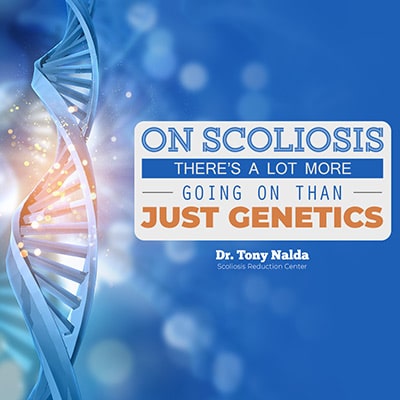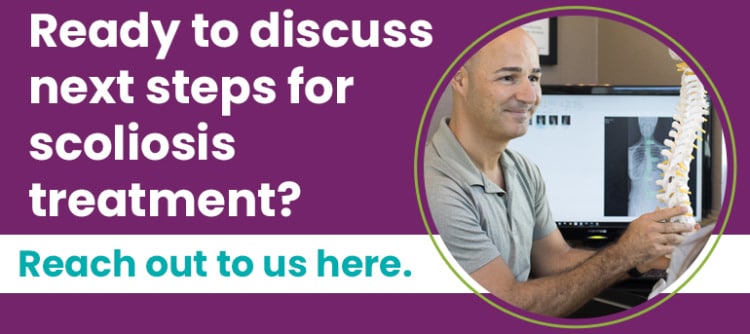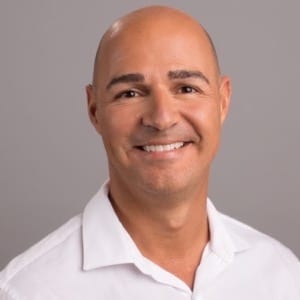When a patient or parent learns of a scoliosis diagnosis, they often turn to the family tree in the search for answers. They want information and an explanation for why the condition has developed. They wonder, “Is scoliosis hereditary?”
I can understand what drives patients and parents to seek answers in their genetics.

Scoliosis is a complex spinal condition characterized by an abnormal spinal curvature. I wish I could give patients the certainty they crave as they try to understand their condition, but the fact is that scoliosis develops as a result of multiple possible factors. And there is no known cause of scoliosis in 80% of cases. If you’re wondering, “is scoliosis hereditary?” the simple answer is no. But it’s actually a little more complicated and nuanced than that. Furthermore, the cause of scoliosis does not matter in terms of how the condition should be treated most effectively.
If you’re wondering, “is scoliosis hereditary?” the simple answer is no. But it’s actually a little more complicated and nuanced than that. Furthermore, the cause of scoliosis does not matter in terms of how the condition should be treated most effectively.
This is a tricky issue, and I want to make sure patients, parents and curious readers of the blog understand the truth about scoliosis, its development and how it is caused.
4 Key Takeaways
- Scoliosis Is Not Strictly Hereditary: Although there may be a genetic predisposition within families, scoliosis itself is not inherited in a simple genetic manner. A variety of factors, including environmental influences and lifestyle, contribute to the development of scoliosis, underscoring the complexity of its causation.
- Multiple Factors Influence Scoliosis: Scoliosis develops from a mix of potential factors rather than a single cause. This includes genetic predisposition, environmental factors, and lifestyle choices, making the condition multifaceted and challenging to predict based on genetics alone.
- Effective Treatment Regardless of Cause: The cause of scoliosis, whether genetic or environmental, does not dictate the effectiveness of treatment. A chiropractic-centered approach, integrating exercises, therapy, and specialized bracing, is effective in managing scoliosis across diverse cases. Understanding curve progression is crucial for developing personalized management strategies for scoliosis.
- Individualized Treatment Plans: Scoliosis treatment at the Scoliosis Reduction Center® is tailored to the individual, focusing on reducing curvature and enhancing function through a combination of chiropractic care, exercise, therapy, and bracing. This personalized approach is key to achieving positive outcomes for patients with scoliosis.
Understanding Scoliosis
Scoliosis is a complex spinal condition characterized by an abnormal curvature of the spine. This condition can affect individuals of all ages, from children to adults, and can significantly impact their quality of life. The causes of scoliosis are multifaceted, involving a mix of genetic predisposition, environmental influences, and underlying medical conditions.
Understanding these causes and risk factors is crucial for early detection and effective management of the condition. Scoliosis can be classified into different types, including idiopathic, congenital, and degenerative scoliosis, each with its unique characteristics and implications.
By gaining a comprehensive understanding of scoliosis, individuals and healthcare providers can work together to develop effective treatment plans and improve outcomes.
What Does Hereditary Mean for Spinal Curvature?
First of all, I think it’s important to understand what “hereditary” means.
In terms of genetics, when a condition is described as “hereditary,” it means that it was passed down from a parent to their offspring; essentially, the parent possesses a particular defective gene, and the child inherits it.
However, truly hereditary conditions and diseases are extremely rare. The inheritance of defective genes seldom happens in reality. Yes, many conditions arise from genetic predispositions, but this is different from defective genes being passed down and inherited by children. Understanding genetic factors is essential to grasp the complexity of how scoliosis may develop in individuals with a family history of the condition.
In the case of scoliosis, most experts agree that there is probably a genetic predisposition, but that doesn’t mean that the condition is hereditary. Some people with a genetic predisposition develop the condition. Others do not. Even identical twins experience differing rates of scoliosis development. If one twin has scoliosis, the other may or may not also have it. Or they may have a completely different curvature or Cobb angle measurement.
If scoliosis were truly hereditary, every twin with scoliosis would share the condition in exactly the same manner with their identical brother or sister. And we know that’s not the case!

Consider heart disease — if a person comes from a line of people who have dealt with the condition, then they may be more susceptible to it themselves. But they can ward off heart disease through diet, exercise and healthy lifestyle choices. There are simply too many factors involved to be able to say that genetics is the sole cause. Nothing is written in stone with heart disease, and the same is true with scoliosis.
Genetic Factors and the Root Causes of Adolescent Idiopathic Scoliosis
I discussed the potential causes of scoliosis in a previous blog post, but the topic is worth revisiting here.
As I mentioned above, 80% of scoliosis cases have no known cause. This is what’s referred to as idiopathic. We know something is causing the scoliosis. But identifying a single cause responsible for the condition is impossible.
Scoliosis is not hereditary and there is no single known gene responsible for the condition. Research into familial idiopathic scoliosis has shown variability in genetic influences, with some studies finding no significant associations.
There is a familial connection, though. Idiopathic scoliosis patients often undergo genetic studies to identify potential polymorphisms linked to disease severity and progression. A genetic predisposition may or may not exist within a family, but family members share much more than just their genes.

Environmental factors also come into play in terms of the development of scoliosis. Families tend to live in the same geographic areas, so those factors may be playing a larger part than genetics. Family members also tend to share things like diet, lifestyle and even posture. They experience similar stresses. They participate in similar activities, too. There’s a lot more going on than just genetics, which is why it’s impossible to determine a single cause.
Because family members share so much in common, it’s easy to see why people would assume a genetic link when scoliosis develops. But the fact is that the condition arises through a multitude of factors, making it impossible to pin the cause on any single element of a person’s life or branch of their family tree.
I understand why this may be disconcerting. But the good news is that the cause of scoliosis doesn’t matter when it comes to treating the condition effectively.
Types of Scoliosis
Idiopathic scoliosis is the most common type of scoliosis, accounting for approximately 80% of cases. This type is characterized by an abnormal curvature of the spine with no known cause.
Among idiopathic scoliosis, adolescent idiopathic scoliosis (AIS) is particularly prevalent, affecting adolescents typically between the ages of 10 and 18.
Congenital scoliosis, on the other hand, is present at birth and results from abnormal development of the spine during fetal development.
Degenerative scoliosis occurs in adults, usually due to the wear and tear on the spine over time. Each type of scoliosis presents unique challenges and requires tailored approaches to treatment and management.
Understanding the differences between these types is essential for accurate diagnosis and effective intervention.
Scoliosis Treatment that Works for Mild to Severe Scoliosis, Regardless of the Cause
I see scoliosis patients of all ages from all over the world. Each one of my patients developed the condition through exposure to a variety of factors. It’s possible that some of them may have been genetically predisposed, but there are probably just as many patients who developed scoliosis in the absence of a genetic predisposition.
Regardless of how they developed the condition, the approach to treating them at the Scoliosis Reduction Center® remains the same — and it’s been tremendously effective.
The combination of chiropractic care, exercise, therapy and specialized bracing reduces curvatures and helps patients develop strength, mobility and function. The reason is that we focus these methods on each patient as an individual. Just as there is no single known cause of scoliosis, there is no one-size-fits-all blueprint for treatment. Each patient is placed on their own specific program based on the specific nature of their spinal curvature. The four pillars of our treatment remain the same, but the journey to healing for each patient is their own.
Is scoliosis hereditary? No. There are a number of factors that determine whether a person will develop scoliosis. But regardless of the cause, the treatment we provide here at the Scoliosis Reduction Center® provides real results!





